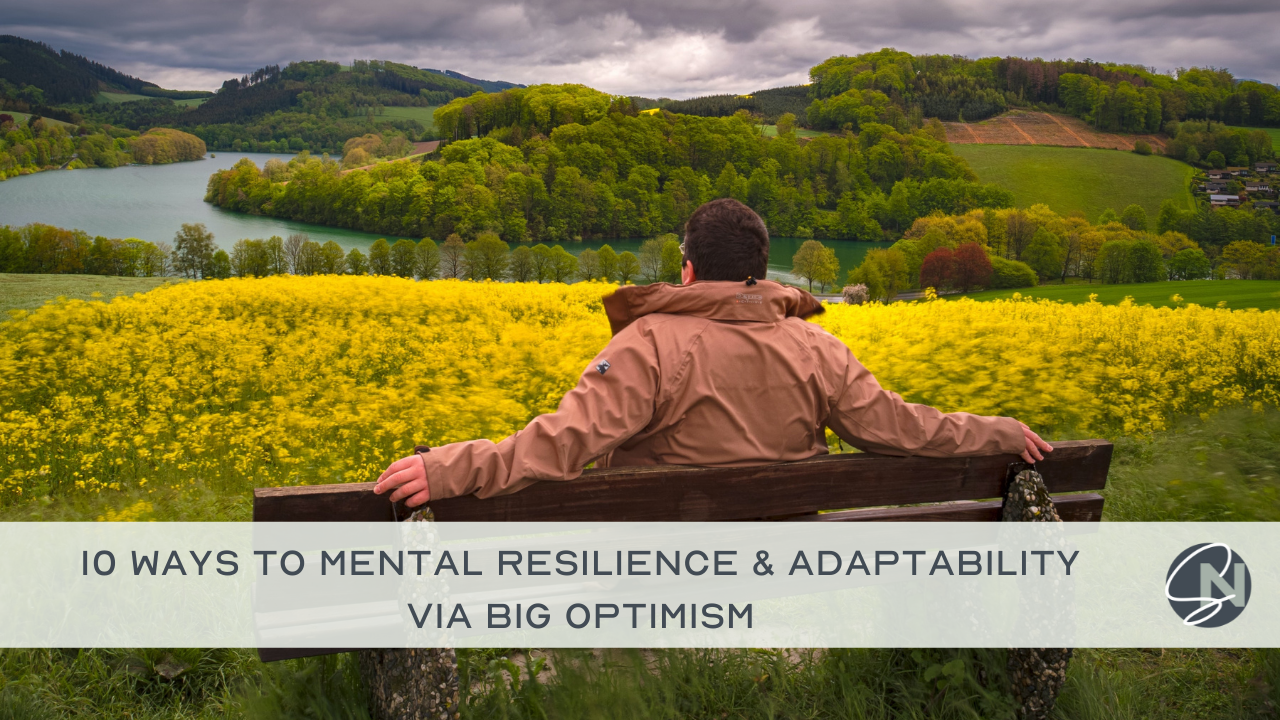10 Ways to Mental Resilience & Adaptability via Big Optimism
Gentlemen, what if I shared with you that there is a skill you can develop that can affect the way you react to stressful situations, be more adaptable in the face of ambiguity and increase the overall quality of your life?
Sounds almost too good to be true, right? Well, it's not. So let's explore this further.
Optimism is an attitude or a mental skill set that can be described as a positive outlook or a happy belief that a specific venture or general outcome in life will be positive. It is derived from the Latin word "optimum," which means "best," so think of it as your ability to expect desirable outcomes in life.
Optimism is derived from the Latin word optimum meaning “best”.
You know the old, "Is your glass-half-full or half-empty?" saying, or the "Look on the bright side" phrase we've all heard countless times. Well, there's actually something to those cliched sayings.
"Big Optimism," or what psychologists call Dispositional Optimism, is the ability to expect more desirable outcomes than bad ones to occur in our future. It has a lot to do with how a guy frames events in his past, his experience of a present moment, and his view of the future. Adding an optimistic mindset to your toolkit can dramatically improve your mental well-being.
Just check out some of the benefits optimists enjoy:
Optimists are better equipped to handle change, disappointment, and significant life events due to their stress coping strategies and their ability to reframe situations, accept what is, and anticipate a subsequent possible positive outcome.
They see bad events as impermanent and good events as likely to recur. As a result, they engage in more social support. Finally, optimists view change and ambiguous situations as something to be challenged, not avoided.
Optimists recognize that a situation might be challenging and are willing to engage rather than avoid due to some anticipated worst-case scenario.
Because they are more flexible and think positively, they are less prone to self-sabotaging behaviors such as believing "Everything that can go wrong, will go wrong," and other negative thinking which can produce stress, anxiety, and depression.
Optimists adapt better to adverse situations, including health challenges. Because of this, they typically discover serious problems earlier than pessimists.
They don't get lost in denial or ignore their problems by engaging in avoidance behaviors. Instead, they deal with the issue, conquer it, and move on.
They generally enjoy a higher quality of life than pessimists do. In addition, their positive attitude impacts their mental and physical health, making them excellent problem solvers and more likely to engage in a healthy lifestyle.
Pessimists, however, face more significant challenges. Their negative thinking impacts everything, right down to their mental and physical well-being. This affects their ability to problem solve and thwarts their ability to be content and happy.
So, what can you do to add optimism to your skillset? Here are 10 practical tactics to adopt to develop a more optimistic mindset.
1 - Realize that you are responsible for your own happiness. Happiness comes from within. Yeah, that sounds cheesy, but consider this: how often do folks chase external things like accomplishments, material goods, etc., thinking, "When this happens, I'll be happy"?
2 - There's no better time than the present. Optimism starts by accepting what is, valuing what you have in the present moment, and realizing that you don't need to chase accomplishments, material possessions, or certain things to be happy.
3 - Try to focus all your energy on solving a problem instead of worrying about it. Look for minor ways to solve the challenge, using all your available options. If you fail, don't blame yourself. Instead, look for the issue that caused your failure, learn from it, and move on.
4 - Train yourself to see opportunities in difficulty. As the saying goes, "When life gives you lemons, make lemonade." This mindset is all about adopting the mental construct of ‘abundance’ versus ‘scarcity’.
5 - Don't waste your time trying to seek approval from others. Realize that you just can't please everyone. Not everyone will like you, and that's ok. People are generally caught up in their own "stuff."
6 - Realize that things won't always be easy. You will have challenges. No one is perfect - we all make mistakes. So let go of any anger and disappointment you've been carrying. It serves no positive benefit in your life.
7 - Trust in your intuition. Stop judging yourself by other's ideas or their opinions or so-called judgments. You are always good enough. We're all a work in progress.
8 - Seek out others with an optimistic disposition. Find your tribe. It's hard to be positive when you're around pessimistic people all the time. Everyone needs a positive support network.
9 - Switch over to positive self-talk. Become mindful of what you say in your head and what you speak. Look at ways you can change your inner speech to include more positive phrasing.
10 - Smile more. Remind yourself of your blessings on a daily basis.
Look, life isn't always easy; we all know that. But, at the end of the day, we're all doing the best we can. We all have challenges, but we men got the impression that we needed to keep them "bottled up" somewhere along the way. We don't.
Implementing optimism in your life will increase your resiliency and ability to handle life's problems. We all deserve to be happy. However, we all have two ways of looking at things; optimistically or pessimistically. It’s a mental choice.
Why not choose the way that is guaranteed to give you the best results? Adding optimism to your skillset is an excellent step toward living your best life possible.
Debrief & digest
• Implementing an optimistic mindset is a skill we can all develop; it’s a practical tactic.
• Dispositional Optimism, is the ability to expect more desirable outcomes than bad ones to occur in our future.
• Optimists generally enjoy a higher quality of life than pessimists do.
If you experience constant intrusive negative thoughts or experience constant pessimism and want to challenge and change your mindset – take that important step and contact me to schedule a free 20 minute phone consultation below. Invest in the most valuable assets you possess; your mind and your mental health and your wellbeing.
If you’re not already subscribed, be sure to sign up for MANIFEST MONDAYS, my free weekly email designed to offer more tools and tips for improved mental health and quality of life.
Cheers, Simon
Simon G. Niblock, MA, LMFT, is a licensed psychotherapist, specializing in men’s mental health and wellness. He provides tailored psychotherapy services and online programs for men and is the author of the Anxiety Workbook for Men, Evidence-based Exercises to Manage Anxiety, Depression, and Worry.
Important Notice: The content in this article is for informational purposes only. It does not replace direct professional mental health, medical treatment, or professional care in any way. Seek the support of a physician or other qualified healthcare provider to diagnose and treat any mental health concern directly. Contact 911 or your local emergency services number if you are experiencing a mental health emergency.

